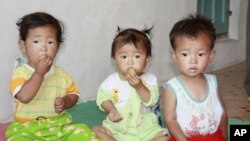Several American aid groups are criticizing the U.S. government delay on deciding whether to resume large-scale food donations to North Korea. The charities warn that if substantial aid is not permitted in the next six to nine months, many vulnerable people in the impoverished communist state could die from starvation.
Five non-governmental organizations, based in the United States, are warning of a potential humanitarian crisis if the U.S. government does not allow the resumption of food aid to North Korea.
Months ago, the groups recommended a food aid program for the segment of the North Korean population they deem most at risk -- women and children. The organizations say they have received no response from Washington.
Earlier in September, a delegation from the groups went on a U.S. government supported trip to several crop-rich North Korean provinces hit by recent flooding. Following the visit, they concluded that health and food security in the country are deteriorating.
“The spread of the severe acute malnutrition, and the rapidity of it, has caused us great alarm," said Kenneth Isaacs, vice president for programs and government relations of one of the involved groups, Samaritan's Purse, a Christian relief organization based in the U.S. state of North Carolina. "And we feel if there is not an intervention in the next six to nine months we will see numerous deaths.”
The groups say millions of North Koreans may be caught in what they call a “political crossfire.”
Isaacs says part of the reason for maintaining a suspension on food shipments appears to be South Korean pressure on Washington.
“We haven't seen any report nor have we heard any contradictions or any challenges to our assessments or World Food Program's assessments. So I don't really know what is going with the U.S. government and how they are calculating things," Isaacs said. "Although it does seem to be quite tied to what the government of the Republic of Korea wants to do or not to do with humanitarian assistance. There's some linkage there.”
South Korea's Unification Ministry tells VOA News that both political and humanitarian concerns have to be taken into consideration when making decisions about resumption of large scale food aid.
The chief U.S. aid official was quoted by the Reuters news agency last week as saying Washington will not resume food aid to Pyongyang until the North Korean government satisfies concerns that it will not divert future shipments for its own use.
Rajiv Shah, who runs the U.S. Agency for International Development (USAID) said there have been no such credible assurances from the North Koreans despite repeated discussions.
In August, Washington sent nearly one million dollars worth of emergency assistance to the North in wake of the flooding. U.S. officials say that shipment mostly consisted of tents and plastic sheeting.
The U.S. government suspended food aid to North Korea in 2008, because of a disagreement about monitoring supplies.
Until international sanctions were imposed on Pyongyang because of its nuclear programs, South Korea and the United States were the biggest aid donors to North Korea.
US Aid Group Criticizes Delay on N. Korea Aid Request
- By Steve Herman





